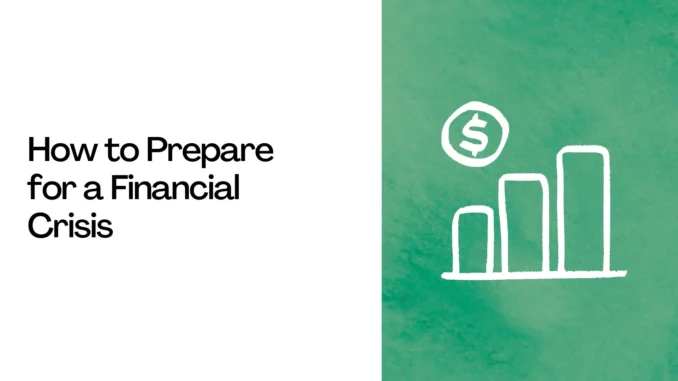
Financial crises can occur unexpectedly and have widespread impacts, causing significant economic turmoil. Preparing in advance can help safeguard your assets and minimize the potential negative effects. Here are essential steps to prepare for a financial crisis:
1. Build an Emergency Fund
An emergency fund is a critical first step in preparing for any financial crisis. Aim to save three to six months’ worth of living expenses in a liquid and easily accessible account, such as a savings account. This fund can provide a buffer during periods of unemployment, medical emergencies, or unexpected expenses.
2. Diversify Your Investments
Diversification can protect your portfolio from significant losses during a financial crisis. Spread your investments across various asset classes, such as stocks, bonds, real estate, and commodities. Diversification reduces the risk of your entire portfolio losing value at the same time.
3. Reduce Debt
High levels of debt can become unmanageable during a financial crisis, especially if your income decreases. Focus on paying down high-interest debt, such as credit cards and personal loans, to reduce financial strain. Avoid taking on new debt unless absolutely necessary.
4. Maintain a Budget
Creating and sticking to a budget helps you understand your financial situation and control your spending. Identify essential expenses and look for areas where you can cut back. During a financial crisis, a well-maintained budget will help you prioritize your spending and manage your resources more effectively.
5. Invest in Skills and Education
Investing in your skills and education can increase your employability and income potential, making you more resilient during economic downturns. Consider furthering your education, acquiring new certifications, or learning new skills that are in demand in the job market.
6. Stay Informed
Keep abreast of economic news and trends. Understanding the financial landscape can help you make informed decisions about your investments and financial strategies. Follow reliable news sources, consult financial advisors, and stay connected with industry developments.
7. Review and Adjust Your Portfolio
Regularly review your investment portfolio to ensure it aligns with your risk tolerance and financial goals. During times of economic uncertainty, it may be necessary to adjust your asset allocation to reduce exposure to high-risk investments. Consider consulting with a financial advisor to make strategic adjustments.
8. Establish Multiple Income Streams
Relying on a single source of income can be risky during a financial crisis. Diversify your income streams by exploring side jobs, freelance opportunities, or passive income sources such as rental properties or dividend-paying investments. Multiple income streams can provide financial stability if one source is disrupted.
9. Protect Your Credit Score
A good credit score is essential for securing favorable loan terms and interest rates. During a financial crisis, access to credit can be crucial. Pay your bills on time, keep your credit card balances low, and regularly check your credit report for errors. Maintaining a strong credit score will help you navigate financial challenges more effectively.
10. Have a Financial Plan
A comprehensive financial plan outlines your financial goals, strategies for achieving them, and contingency plans for potential crises. Work with a financial advisor to develop a plan that includes risk management, retirement planning, and investment strategies. Having a clear plan can provide peace of mind and a roadmap during uncertain times.
Conclusion
Preparing for a financial crisis involves proactive measures to safeguard your assets and ensure financial stability. By building an emergency fund, diversifying investments, reducing debt, maintaining a budget, investing in skills, staying informed, adjusting your portfolio, establishing multiple income streams, protecting your credit score, and having a financial plan, you can better navigate economic uncertainties and protect your financial future. Taking these steps now will help you weather any financial storm that may come your way.
Leave a Reply